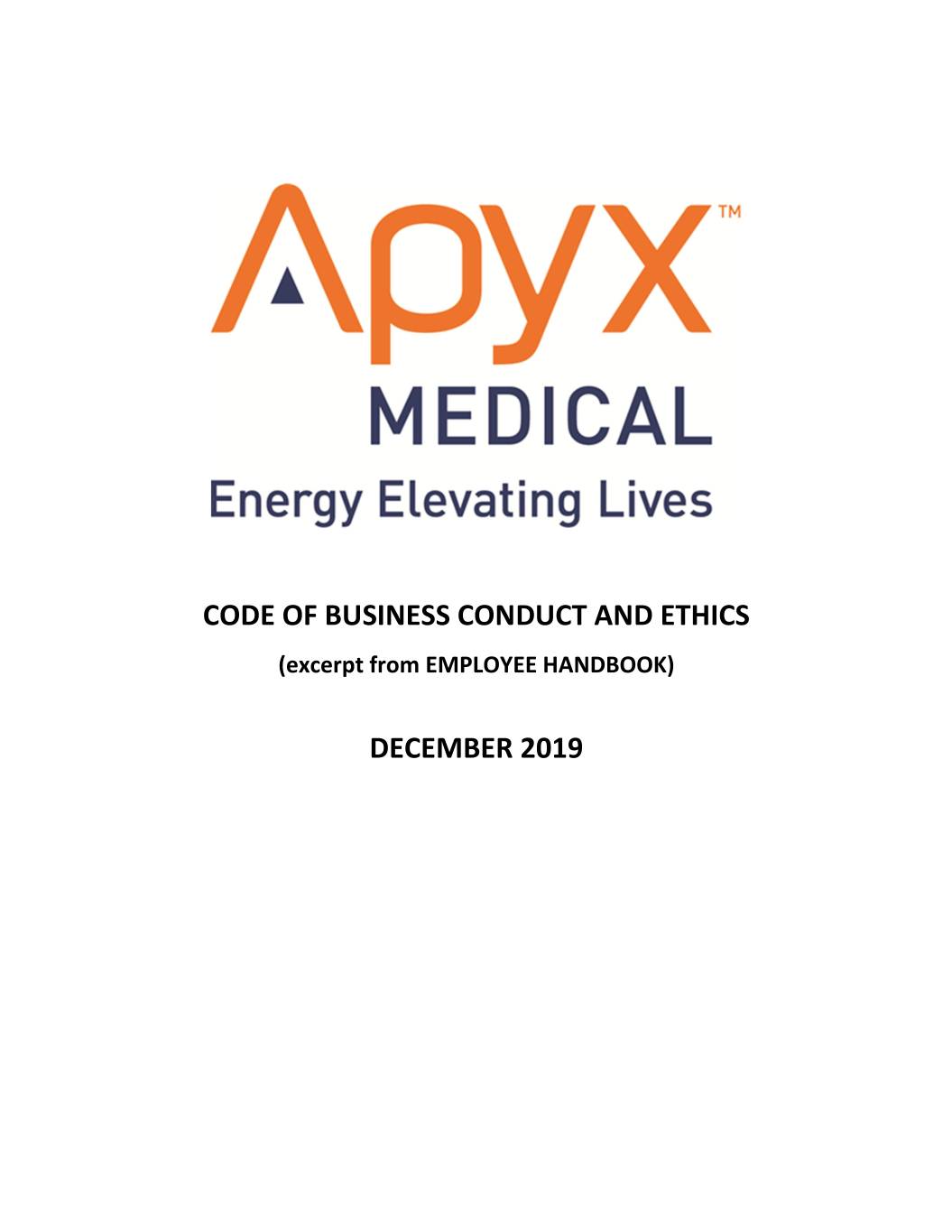
CODE OF BUSINESS CONDUCT AND ETHICS (excerpt from EMPLOYEE HANDBOOK) DECEMBER 2019
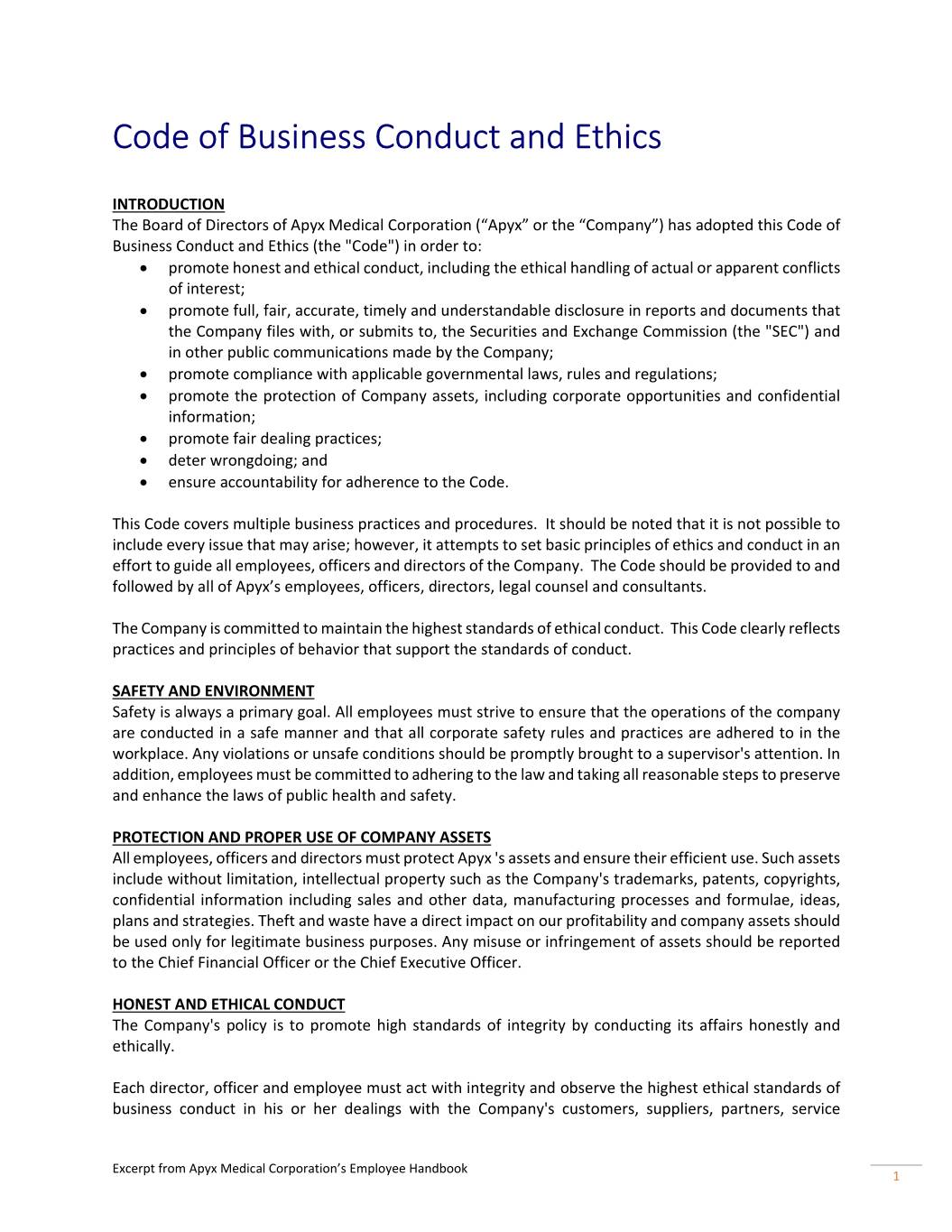
Code of Business Conduct and Ethics INTRODUCTION The Board of Directors of Apyx Medical Corporation (“Apyx” or the “Company”) has adopted this Code of Business Conduct and Ethics (the "Code") in order to: promote honest and ethical conduct, including the ethical handling of actual or apparent conflicts of interest; promote full, fair, accurate, timely and understandable disclosure in reports and documents that the Company files with, or submits to, the Securities and Exchange Commission (the "SEC") and in other public communications made by the Company; promote compliance with applicable governmental laws, rules and regulations; promote the protection of Company assets, including corporate opportunities and confidential information; promote fair dealing practices; deter wrongdoing; and ensure accountability for adherence to the Code. This Code covers multiple business practices and procedures. It should be noted that it is not possible to include every issue that may arise; however, it attempts to set basic principles of ethics and conduct in an effort to guide all employees, officers and directors of the Company. The Code should be provided to and followed by all of Apyx’s employees, officers, directors, legal counsel and consultants. The Company is committed to maintain the highest standards of ethical conduct. This Code clearly reflects practices and principles of behavior that support the standards of conduct. SAFETY AND ENVIRONMENT Safety is always a primary goal. All employees must strive to ensure that the operations of the company are conducted in a safe manner and that all corporate safety rules and practices are adhered to in the workplace. Any violations or unsafe conditions should be promptly brought to a supervisor's attention. In addition, employees must be committed to adhering to the law and taking all reasonable steps to preserve and enhance the laws of public health and safety. PROTECTION AND PROPER USE OF COMPANY ASSETS All employees, officers and directors must protect Apyx 's assets and ensure their efficient use. Such assets include without limitation, intellectual property such as the Company's trademarks, patents, copyrights, confidential information including sales and other data, manufacturing processes and formulae, ideas, plans and strategies. Theft and waste have a direct impact on our profitability and company assets should be used only for legitimate business purposes. Any misuse or infringement of assets should be reported to the Chief Financial Officer or the Chief Executive Officer. HONEST AND ETHICAL CONDUCT The Company's policy is to promote high standards of integrity by conducting its affairs honestly and ethically. Each director, officer and employee must act with integrity and observe the highest ethical standards of business conduct in his or her dealings with the Company's customers, suppliers, partners, service Excerpt from Apyx Medical Corporation’s Employee Handbook 1

providers, competitors, employees and anyone else with whom he or she has contact in the course of performing his or her job. COMPLIANCE WITH APPLICABLE LAWS All employees, officers and directors of the Company must be in compliance with the laws, rules and regulations of the United States and the countries in which Apyx operates. The payment or receipt of Kickbacks, bribes or other illegal compensation are strictly prohibited and must not be paid or accepted by any individual employed by or representing Apyx in any capacity. CONFIDENTIALITY Employees, officers and directors must maintain the confidentiality of all information entrusted to them by Apyx, our customers, sales brokers, or suppliers, or others with whom we may conduct business, except when disclosure of information is specifically authorized by an executive of Apyx or required as a matter of law. Confidential information includes any information that has not been made available to the public that provides knowledge of our current or anticipated business activities. It also includes important nonpublic information about firms with which we have dealings, including customers, sales brokers and suppliers. You should not share confidential information with friends, relatives or other non‐employees, or discuss any confidential matters in public places, such as elevators, transportation (including airplanes) or restaurants. PROHIBITION AGAINST INSIDER TRADING Officers and directors who have knowledge of material nonpublic information about Apyx are prohibited from buying, selling or otherwise trading in the Company’s stock. “Material nonpublic” information includes any information, positive or negative that has not yet been made available or disclosed to the public and that might be of significance to an investor. Such insiders also are prohibited from giving “tips” on material nonpublic information, that is directly or indirectly of such information to any other person, including but not limited to family members, other relatives and friends. Furthermore, if, in due course of your service you acquire material nonpublic information about another company, such as our customers or suppliers, you are restricted from trading in the securities of the other company. Such “insider trading” is illegal, with criminal and civil penalties. INSIDER TRADING There are currently (according to the Securities and Exchange Commission) two types of insider trading: legal and illegal. Illegal Insider Trading Illegal insider trading is the buying or selling of a security by insiders who possess “material” non‐public information. A director, officer, employee, consultant or etc. who acts on non‐public favorable or non‐ favorable information is in clear breach of their fiduciary duty. It should be noted that it is a misconception that only directors and upper management can be convicted of insider trading. The law, including SEC Rule 10b5‐1, is clear in stating that anybody who has material and non‐public information can commit such an act. To clarify, this prohibition also covers brokers, family, friends, employees and consultants. Excerpt from Apyx Medical Corporation’s Employee Handbook 2

The following are examples of illegal trading: Knowledge of financial results prior to release to the public Loss of a large contract prior to release of information to the public A company plans to register additional shares which would result in a dilution of its outstanding shares Negotiation and entering into a large contract prior to release of information to the public Notice of FDA approval of a Company product prior to release of information to the public These are only examples and each case would be examined on a case‐by‐case basis. An individual who does not make the trade but provides material non‐public information to an outsider who makes a trade can be caught as a “tipster”. The tipster can also be found liable. Legal Insider Trading Insiders legally buy and sell company stock; their trading is restricted and illegal only at certain times and under certain conditions. Insiders are required to report their transactions to the SEC often electronically (although not required to be filed electronically). The law of insider trading can be summarized by stating that stock market transactions made with knowledge of material nonpublic information about corporate activity is illegal and the SEC regards it as unfair to investors who are not privy to such information. The SEC and the United States Attorney’s Office have the authority and responsibility to prosecute cases of illegal insider trading, both civilly and criminally. Insider Trading Policy The Company’s Insider Trading Policy provides guidelines to all employees and officers of Apyx Medical Corporation as well as members of the Company’s Board of Directors (the “Directors”) with respect to transactions in the Company’s securities, and codifies the Company’s standards on trading and enabling the trading of securities of the Company or other publicly‐traded companies while in possession of material non‐public information. The Policy applies to Directors, officers and employees of the Company (“Insiders”), and is divided into two parts: • Part I applies to all Insiders, and prohibits trading in the Company’s and other companies’ securities in certain circumstances; and • Part II applies to Directors and certain officers and employees of the Company who typically have access to financial and other highly sensitive information regarding the Company’s business and imposes additional restrictions on those individuals with respect to trading in the Company’s securities. Exceptions for Certain Transactions This Policy does not apply to all transactions involving the Company’s securities. The following exceptions are intended to facilitate several common types of transactions. • Stock Option Exercises. This Policy does not apply to the mere exercise of a stock option for cash under the Company’s stock option plans. This Policy does apply, however, to: Excerpt from Apyx Medical Corporation’s Employee Handbook 3
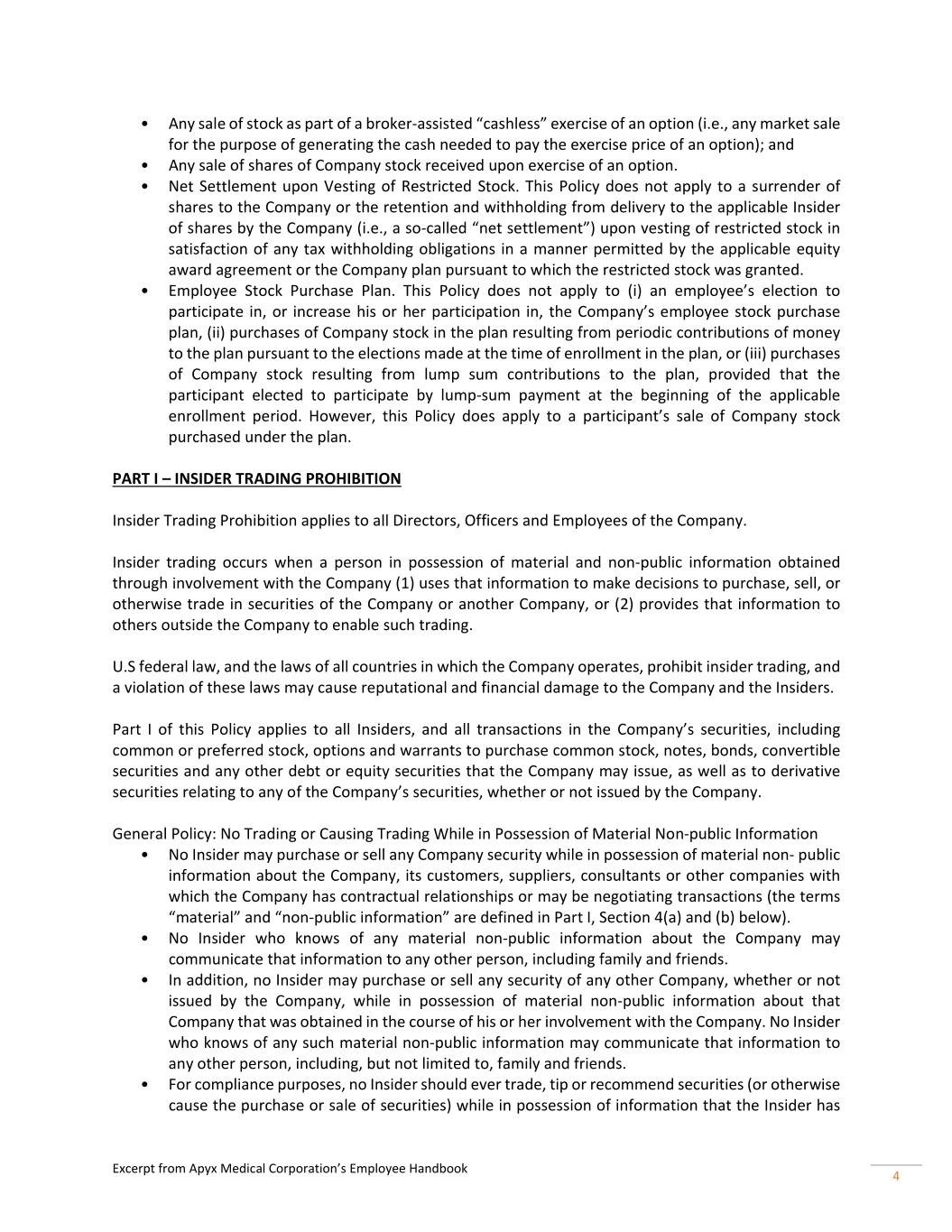
• Any sale of stock as part of a broker‐assisted “cashless” exercise of an option (i.e., any market sale for the purpose of generating the cash needed to pay the exercise price of an option); and • Any sale of shares of Company stock received upon exercise of an option. • Net Settlement upon Vesting of Restricted Stock. This Policy does not apply to a surrender of shares to the Company or the retention and withholding from delivery to the applicable Insider of shares by the Company (i.e., a so‐called “net settlement”) upon vesting of restricted stock in satisfaction of any tax withholding obligations in a manner permitted by the applicable equity award agreement or the Company plan pursuant to which the restricted stock was granted. • Employee Stock Purchase Plan. This Policy does not apply to (i) an employee’s election to participate in, or increase his or her participation in, the Company’s employee stock purchase plan, (ii) purchases of Company stock in the plan resulting from periodic contributions of money to the plan pursuant to the elections made at the time of enrollment in the plan, or (iii) purchases of Company stock resulting from lump sum contributions to the plan, provided that the participant elected to participate by lump‐sum payment at the beginning of the applicable enrollment period. However, this Policy does apply to a participant’s sale of Company stock purchased under the plan. PART I – INSIDER TRADING PROHIBITION Insider Trading Prohibition applies to all Directors, Officers and Employees of the Company. Insider trading occurs when a person in possession of material and non‐public information obtained through involvement with the Company (1) uses that information to make decisions to purchase, sell, or otherwise trade in securities of the Company or another Company, or (2) provides that information to others outside the Company to enable such trading. U.S federal law, and the laws of all countries in which the Company operates, prohibit insider trading, and a violation of these laws may cause reputational and financial damage to the Company and the Insiders. Part I of this Policy applies to all Insiders, and all transactions in the Company’s securities, including common or preferred stock, options and warrants to purchase common stock, notes, bonds, convertible securities and any other debt or equity securities that the Company may issue, as well as to derivative securities relating to any of the Company’s securities, whether or not issued by the Company. General Policy: No Trading or Causing Trading While in Possession of Material Non‐public Information • No Insider may purchase or sell any Company security while in possession of material non‐ public information about the Company, its customers, suppliers, consultants or other companies with which the Company has contractual relationships or may be negotiating transactions (the terms “material” and “non‐public information” are defined in Part I, Section 4(a) and (b) below). • No Insider who knows of any material non‐public information about the Company may communicate that information to any other person, including family and friends. • In addition, no Insider may purchase or sell any security of any other Company, whether or not issued by the Company, while in possession of material non‐public information about that Company that was obtained in the course of his or her involvement with the Company. No Insider who knows of any such material non‐public information may communicate that information to any other person, including, but not limited to, family and friends. • For compliance purposes, no Insider should ever trade, tip or recommend securities (or otherwise cause the purchase or sale of securities) while in possession of information that the Insider has Excerpt from Apyx Medical Corporation’s Employee Handbook 4
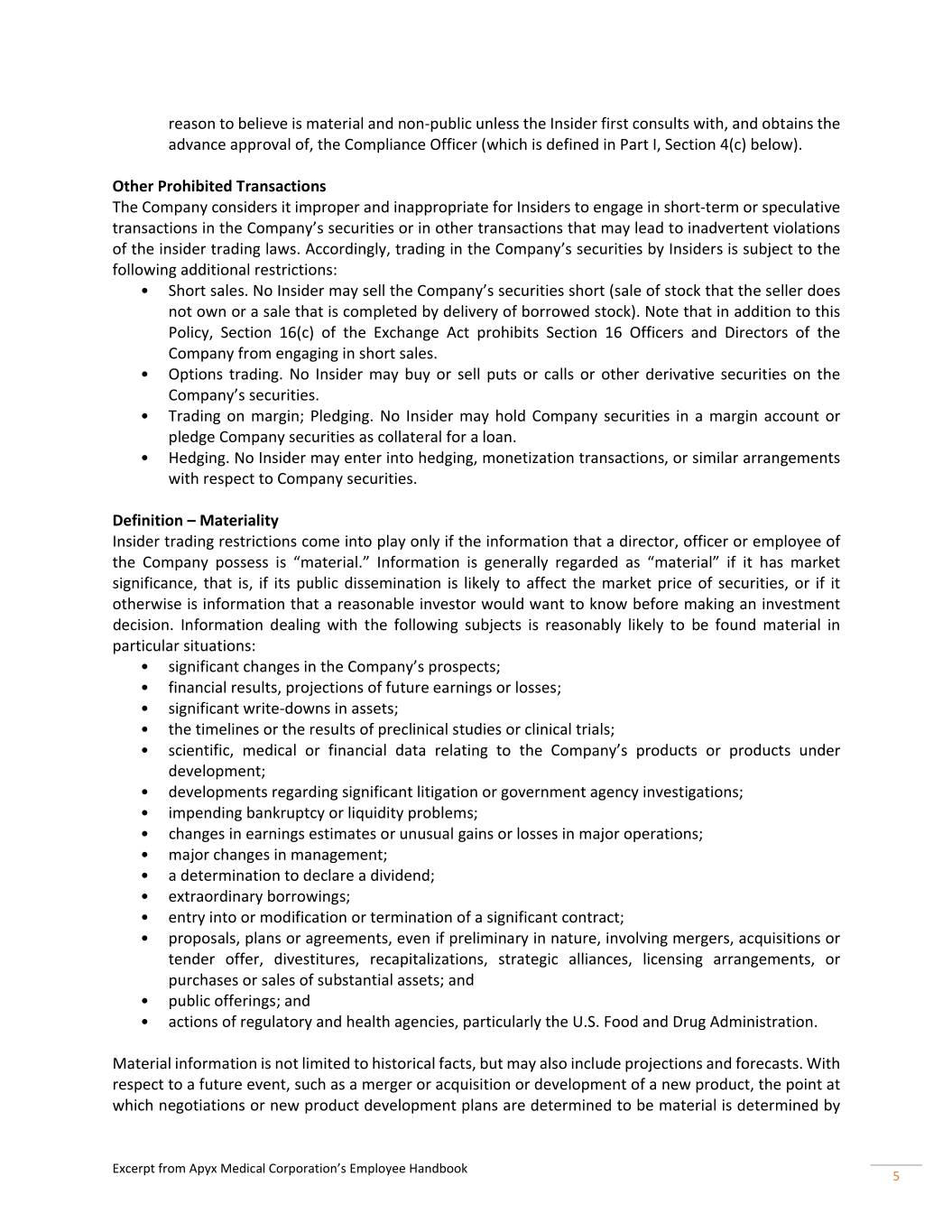
reason to believe is material and non‐public unless the Insider first consults with, and obtains the advance approval of, the Compliance Officer (which is defined in Part I, Section 4(c) below). Other Prohibited Transactions The Company considers it improper and inappropriate for Insiders to engage in short‐term or speculative transactions in the Company’s securities or in other transactions that may lead to inadvertent violations of the insider trading laws. Accordingly, trading in the Company’s securities by Insiders is subject to the following additional restrictions: • Short sales. No Insider may sell the Company’s securities short (sale of stock that the seller does not own or a sale that is completed by delivery of borrowed stock). Note that in addition to this Policy, Section 16(c) of the Exchange Act prohibits Section 16 Officers and Directors of the Company from engaging in short sales. • Options trading. No Insider may buy or sell puts or calls or other derivative securities on the Company’s securities. • Trading on margin; Pledging. No Insider may hold Company securities in a margin account or pledge Company securities as collateral for a loan. • Hedging. No Insider may enter into hedging, monetization transactions, or similar arrangements with respect to Company securities. Definition – Materiality Insider trading restrictions come into play only if the information that a director, officer or employee of the Company possess is “material.” Information is generally regarded as “material” if it has market significance, that is, if its public dissemination is likely to affect the market price of securities, or if it otherwise is information that a reasonable investor would want to know before making an investment decision. Information dealing with the following subjects is reasonably likely to be found material in particular situations: • significant changes in the Company’s prospects; • financial results, projections of future earnings or losses; • significant write‐downs in assets; • the timelines or the results of preclinical studies or clinical trials; • scientific, medical or financial data relating to the Company’s products or products under development; • developments regarding significant litigation or government agency investigations; • impending bankruptcy or liquidity problems; • changes in earnings estimates or unusual gains or losses in major operations; • major changes in management; • a determination to declare a dividend; • extraordinary borrowings; • entry into or modification or termination of a significant contract; • proposals, plans or agreements, even if preliminary in nature, involving mergers, acquisitions or tender offer, divestitures, recapitalizations, strategic alliances, licensing arrangements, or purchases or sales of substantial assets; and • public offerings; and • actions of regulatory and health agencies, particularly the U.S. Food and Drug Administration. Material information is not limited to historical facts, but may also include projections and forecasts. With respect to a future event, such as a merger or acquisition or development of a new product, the point at which negotiations or new product development plans are determined to be material is determined by Excerpt from Apyx Medical Corporation’s Employee Handbook 5
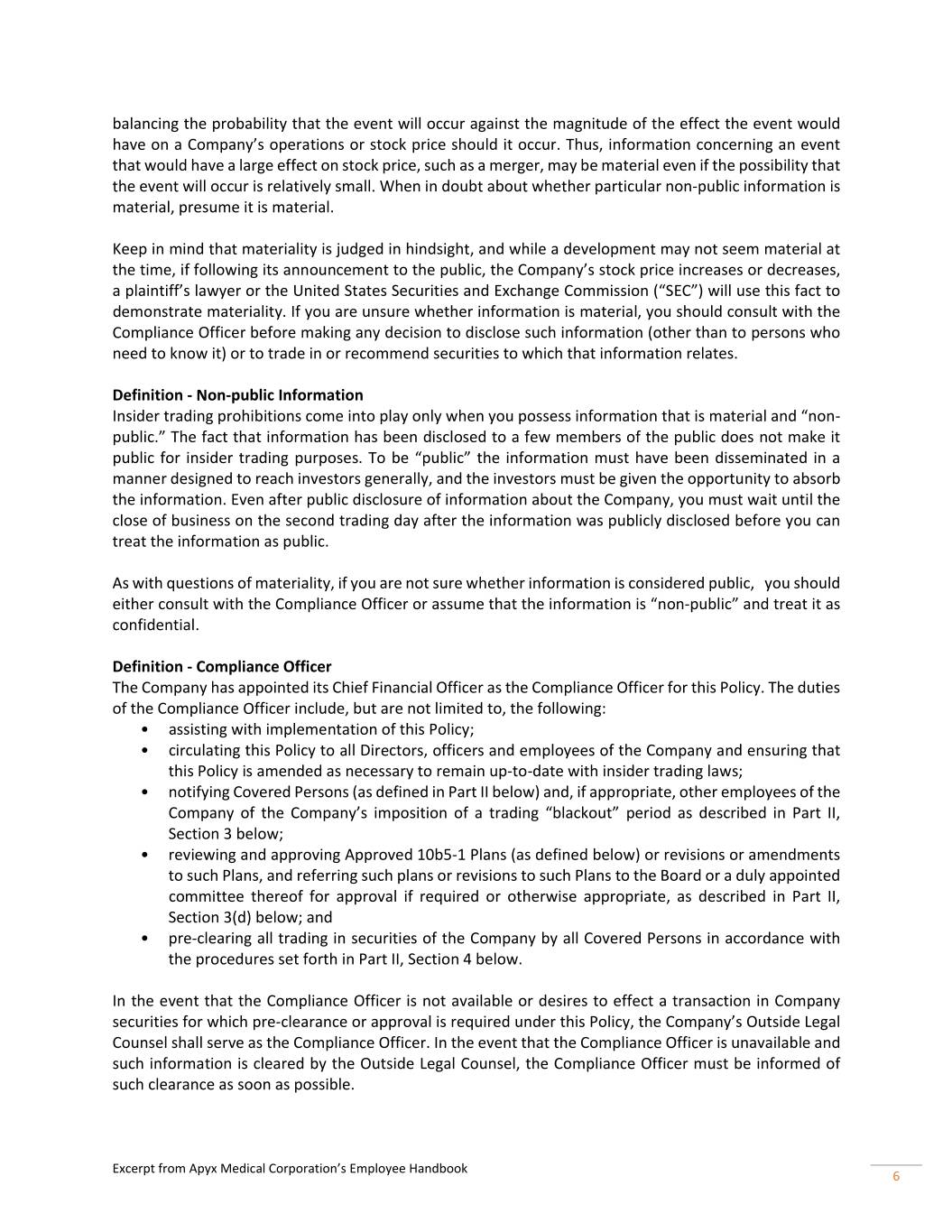
balancing the probability that the event will occur against the magnitude of the effect the event would have on a Company’s operations or stock price should it occur. Thus, information concerning an event that would have a large effect on stock price, such as a merger, may be material even if the possibility that the event will occur is relatively small. When in doubt about whether particular non‐public information is material, presume it is material. Keep in mind that materiality is judged in hindsight, and while a development may not seem material at the time, if following its announcement to the public, the Company’s stock price increases or decreases, a plaintiff’s lawyer or the United States Securities and Exchange Commission (“SEC”) will use this fact to demonstrate materiality. If you are unsure whether information is material, you should consult with the Compliance Officer before making any decision to disclose such information (other than to persons who need to know it) or to trade in or recommend securities to which that information relates. Definition ‐ Non‐public Information Insider trading prohibitions come into play only when you possess information that is material and “non‐ public.” The fact that information has been disclosed to a few members of the public does not make it public for insider trading purposes. To be “public” the information must have been disseminated in a manner designed to reach investors generally, and the investors must be given the opportunity to absorb the information. Even after public disclosure of information about the Company, you must wait until the close of business on the second trading day after the information was publicly disclosed before you can treat the information as public. As with questions of materiality, if you are not sure whether information is considered public, you should either consult with the Compliance Officer or assume that the information is “non‐public” and treat it as confidential. Definition ‐ Compliance Officer The Company has appointed its Chief Financial Officer as the Compliance Officer for this Policy. The duties of the Compliance Officer include, but are not limited to, the following: • assisting with implementation of this Policy; • circulating this Policy to all Directors, officers and employees of the Company and ensuring that this Policy is amended as necessary to remain up‐to‐date with insider trading laws; • notifying Covered Persons (as defined in Part II below) and, if appropriate, other employees of the Company of the Company’s imposition of a trading “blackout” period as described in Part II, Section 3 below; • reviewing and approving Approved 10b5‐1 Plans (as defined below) or revisions or amendments to such Plans, and referring such plans or revisions to such Plans to the Board or a duly appointed committee thereof for approval if required or otherwise appropriate, as described in Part II, Section 3(d) below; and • pre‐clearing all trading in securities of the Company by all Covered Persons in accordance with the procedures set forth in Part II, Section 4 below. In the event that the Compliance Officer is not available or desires to effect a transaction in Company securities for which pre‐clearance or approval is required under this Policy, the Company’s Outside Legal Counsel shall serve as the Compliance Officer. In the event that the Compliance Officer is unavailable and such information is cleared by the Outside Legal Counsel, the Compliance Officer must be informed of such clearance as soon as possible. Excerpt from Apyx Medical Corporation’s Employee Handbook 6

Violations of Insider Trading Laws Penalties for trading on or communicating material non‐public information can be severe, both for individuals involved in such unlawful conduct and their employers and supervisors. Penalties may include jail terms, criminal fines, civil penalties and civil enforcement injunctions. Given the severity of the potential penalties, compliance with this Policy is absolutely mandatory. A person who tips others may also be liable for transactions by the tippees to whom he or she has disclosed material non‐public information. Tippers can be subject to the same penalties and sanctions as the tippees. The SEC has imposed large penalties even when the tipper did not profit from the transaction. Individuals who violate this Policy may be subject to disciplinary action by the Company, up to and including dismissal for cause. Any exceptions to the Policy, if permitted, may only be granted by the Compliance Officer in writing and must be provided before any activity contrary to the above requirements takes place. PART II – ADDITIONAL RESTRICTIONS FOR COVERED PERSONS Covered Persons are the individuals described below (collectively, “Covered Persons”): • Current Directors of the Company and its affiliates; • “Executive officers” of the Company as described in Rule 3b‐7 under the Securities Exchange Act of 1934, as amended (“Exchange Act”), and all individuals designated as “officers” of the Company for purposes of Section 16 under the Exchange Act (“Section 16 Officers”); • All employees in the accounting, finance, investor relations, and law departments of the Company and its affiliates; • Immediate family members (parents, siblings, spouses, children) and household members of each of the foregoing groups. The Company’s Compliance Officer may designate additional “Covered Persons” from time to time as described in Part II, Section 3. Because Covered Persons are exposed to a wider range of material non‐public information than their colleagues (e.g., information regarding quarterly results, strategic transactions, or the like), this Policy includes additional restrictions on transactions by such persons. BLACKOUT PERIODS • Persons Covered. All Covered Persons are prohibited from trading in the Company’s securities during blackout periods. In addition, the Compliance Officer may notify other employees of the Company that they are prohibited from trading in the Company’s securities during blackout periods, in which event such notified persons shall also be considered “Covered Persons.” • Quarterly Blackout Periods. Announcement of quarterly financial results almost always has the potential to have a material effect on the market for its securities. Therefore, to avoid even the appearance of trading on the basis of material, non‐public information, and to assist compliance with insider trading laws, the Company has created the following blackout periods during which Covered Persons may not trade in the securities of the Company: o From December 16 until the end of the second trading day following public announcement of fourth quarter and year‐end financial results; Excerpt from Apyx Medical Corporation’s Employee Handbook 7

o From March 16 until the end of the second trading day following public announcement of first quarter financial results; o From June 16 until the end of the second trading day following public announcement of second quarter financial results; and o From September 16 until the end of the second trading day following public announcement of third quarter financial results. • Other Blackout Periods. From time to time, other types of material non‐public information regarding the Company (such as negotiation of mergers, acquisitions or dispositions, new product developments, clinical trials, or other material events) may be pending and not be publicly disclosed. While such material non‐public information is pending, the Company may impose special blackout periods during which Covered Persons are prohibited from trading in the Company’s securities. Approved Rule 10b5‐1 Plans These trading restrictions do not apply to transactions by Covered Persons under a pre‐existing written plan, contract, instruction or arrangement under Exchange Act Rule 10b5‐1 (“Approved 10b5‐1 Plan”) that: • has been reviewed and approved at least thirty days in advance of any trades thereunder by the Compliance Officer (or, if an Approved 10b5‐1 plan is to be revised or amended, such revision or amendment has been reviewed and approved by the Compliance Officer at least thirty days in advance of any subsequent trades); • was entered into in good faith by the Covered Person outside a Blackout Period and at a time when he or she was not in possession of material non‐public information about the Company; and • gives a third party the authority to execute such purchases and sales, outside the control of the applicable officer, Director or employee, providing such third party does not possess any material non‐public information about the Company, or explicitly specifies the security or securities to be purchased or sold, the number of shares, the prices and/or dates of transactions, or other formula(s) describing such transactions. Pre‐clearance of Securities Transactions • Because Covered Persons are likely to obtain material non‐public information on a regular basis, the Company requires all Covered Persons to obtain a pre‐clearance, even outside a Blackout Period, from the Compliance Officer for all transactions in the Company’s securities. For trades by the CFO, pre‐clearance from the Outside Legal Counsel is required. • These procedures also apply to transactions by such person’s spouse, other persons living in such person’s household and minor children and to transactions by entities over which such person exercises control. • Unless revoked, a grant of permission will normally remain valid until the close of trading five days following the day on which it was granted. If the transaction does not occur during the five‐day period, pre‐clearance of the transaction must be re‐requested. • Pre‐clearance is not required for purchases and sales of securities under an Approved 10b5‐1 Plan. With respect to any purchase or sale under an Approved 10b5‐1 Plan, the third party effecting transactions on behalf of the applicable Covered Person should be instructed to send duplicate confirmations of all such transactions to the Compliance Officer. In addition, pre‐clearance is not required for stock option exercises and net issuances of restricted stock under the limited circumstances described in the introduction to this Policy. Excerpt from Apyx Medical Corporation’s Employee Handbook 8

Short Term Trading by Covered Persons Section 16 Officers and Directors who purchase Company securities may not sell any Company securities of the same class for at least six months after the purchase. This prohibition does not apply to stock option exercises (whether regular or cashless) and Employee Stock Purchase Plan purchases. Note that in addition to this Policy, under Section 16(b) of the Exchange Act, any “short‐swing profits” realized by a Section 16 Officer or director of the Company from a “matching” purchase and sale or “matching” sale and purchase of Company stock occurring within a six‐month period would be subject to disgorgement to the Company. Note that under Section 16(b), the highest sale price is matched with the lowest purchase price in determining profit, and purchases and sales that result in a loss are ignored— meaning that under these rules, you could be deemed to have a profit to be disgorged even though you actually lose money on your trades in the aggregate. There is an active group of lawyers that track purchases and sales by Section 16 Officers and Directors for violation of these rules. There is no defense to a violation of these rules. FAIR DEALING All employees, officers, directors and consultants must endeavor to operate fairly and in good faith with fellow employees and customers. No individual employed by the Company or representing the Company shall deliberately attempt to take unfair advantage of anyone. The Company’s policy is clear: To select, place and work with every individual in every capacity without discrimination based on race, national origin, gender, age, religion, disability or any other characteristic protected by law. CORPORATE OPPORTUNITIES All directors, officers and employees owe a duty to the Company to advance its interests when the opportunity arises. Directors, officers and employees are prohibited from taking for themselves personally (or for the benefit of friends or family members) opportunities that are discovered through the use of Company assets, property, information or position. Directors, officers and employees may not use Company assets, property, information or position for personal gain (including gain of friends or family members). In addition, no director, officer or employee may compete with the Company. CONFLICTS OF INTEREST A conflict of interest occurs when an individual's private interest (or the interest of a member of his or her family) interferes, or even appears to interfere, with the interests of the Company as a whole. A conflict of interest can arise when an employee, officer or director (or a member of his or her family) takes actions or has interests that may make it difficult to perform his or her work for the Company objectively and effectively. Conflicts of interest also arise when an employee, officer or director (or a member of his or her family) receives improper personal benefits as a result of his or her position in the Company. Loans by the Company to, or guarantees by the Company of obligations of, employees or their family members are of special concern and could constitute improper personal benefits to the recipients of such loans or guarantees, depending on the facts and circumstances. Loans by the Company to, or guarantees by the Company of obligations of, any director or officer or their family members are expressly prohibited. Whether or not a conflict of interest exists or will exist can be unclear. Conflicts of interest should be avoided unless specifically authorized by the Company. Excerpt from Apyx Medical Corporation’s Employee Handbook 9
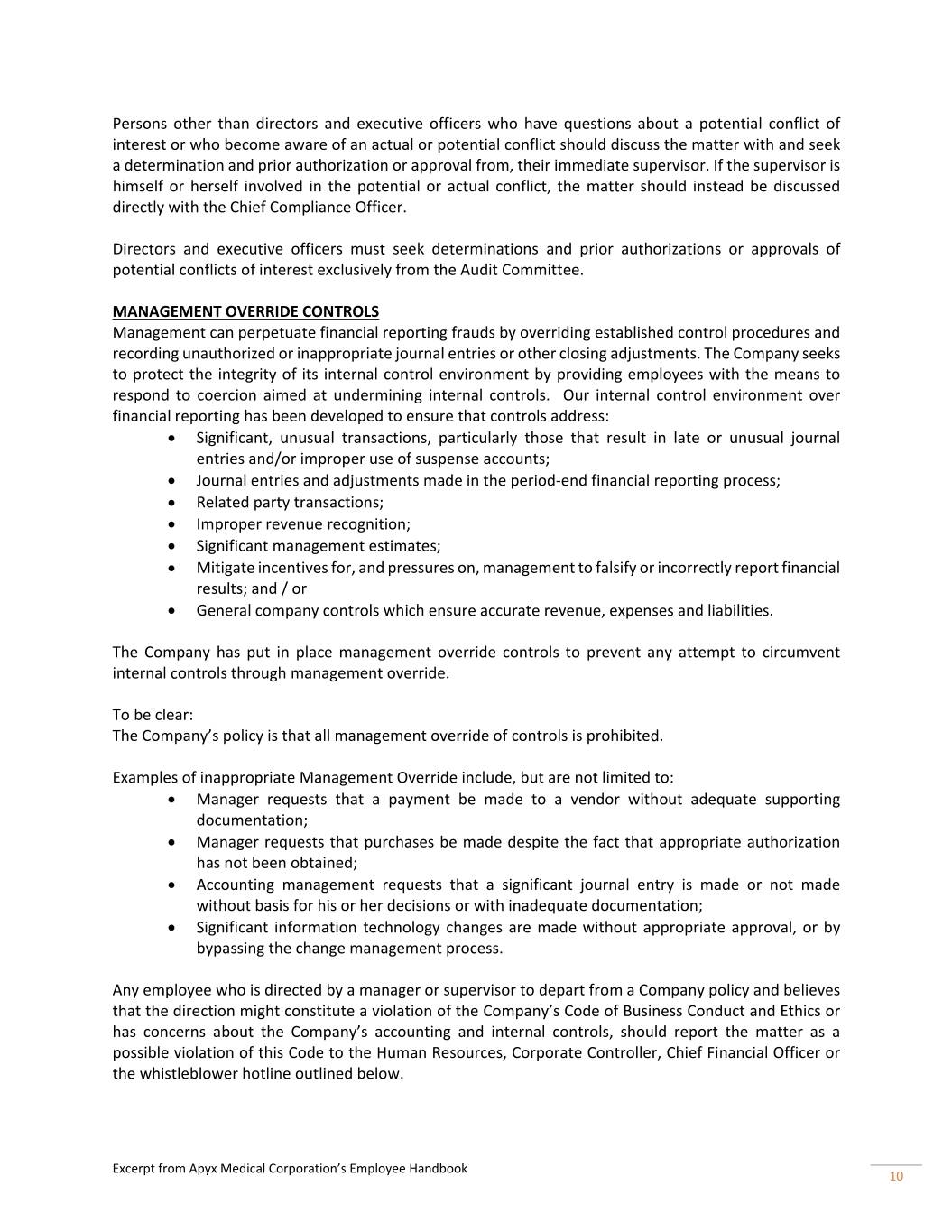
Persons other than directors and executive officers who have questions about a potential conflict of interest or who become aware of an actual or potential conflict should discuss the matter with and seek a determination and prior authorization or approval from, their immediate supervisor. If the supervisor is himself or herself involved in the potential or actual conflict, the matter should instead be discussed directly with the Chief Compliance Officer. Directors and executive officers must seek determinations and prior authorizations or approvals of potential conflicts of interest exclusively from the Audit Committee. MANAGEMENT OVERRIDE CONTROLS Management can perpetuate financial reporting frauds by overriding established control procedures and recording unauthorized or inappropriate journal entries or other closing adjustments. The Company seeks to protect the integrity of its internal control environment by providing employees with the means to respond to coercion aimed at undermining internal controls. Our internal control environment over financial reporting has been developed to ensure that controls address: Significant, unusual transactions, particularly those that result in late or unusual journal entries and/or improper use of suspense accounts; Journal entries and adjustments made in the period‐end financial reporting process; Related party transactions; Improper revenue recognition; Significant management estimates; Mitigate incentives for, and pressures on, management to falsify or incorrectly report financial results; and / or General company controls which ensure accurate revenue, expenses and liabilities. The Company has put in place management override controls to prevent any attempt to circumvent internal controls through management override. To be clear: The Company’s policy is that all management override of controls is prohibited. Examples of inappropriate Management Override include, but are not limited to: Manager requests that a payment be made to a vendor without adequate supporting documentation; Manager requests that purchases be made despite the fact that appropriate authorization has not been obtained; Accounting management requests that a significant journal entry is made or not made without basis for his or her decisions or with inadequate documentation; Significant information technology changes are made without appropriate approval, or by bypassing the change management process. Any employee who is directed by a manager or supervisor to depart from a Company policy and believes that the direction might constitute a violation of the Company’s Code of Business Conduct and Ethics or has concerns about the Company’s accounting and internal controls, should report the matter as a possible violation of this Code to the Human Resources, Corporate Controller, Chief Financial Officer or the whistleblower hotline outlined below. Excerpt from Apyx Medical Corporation’s Employee Handbook 10
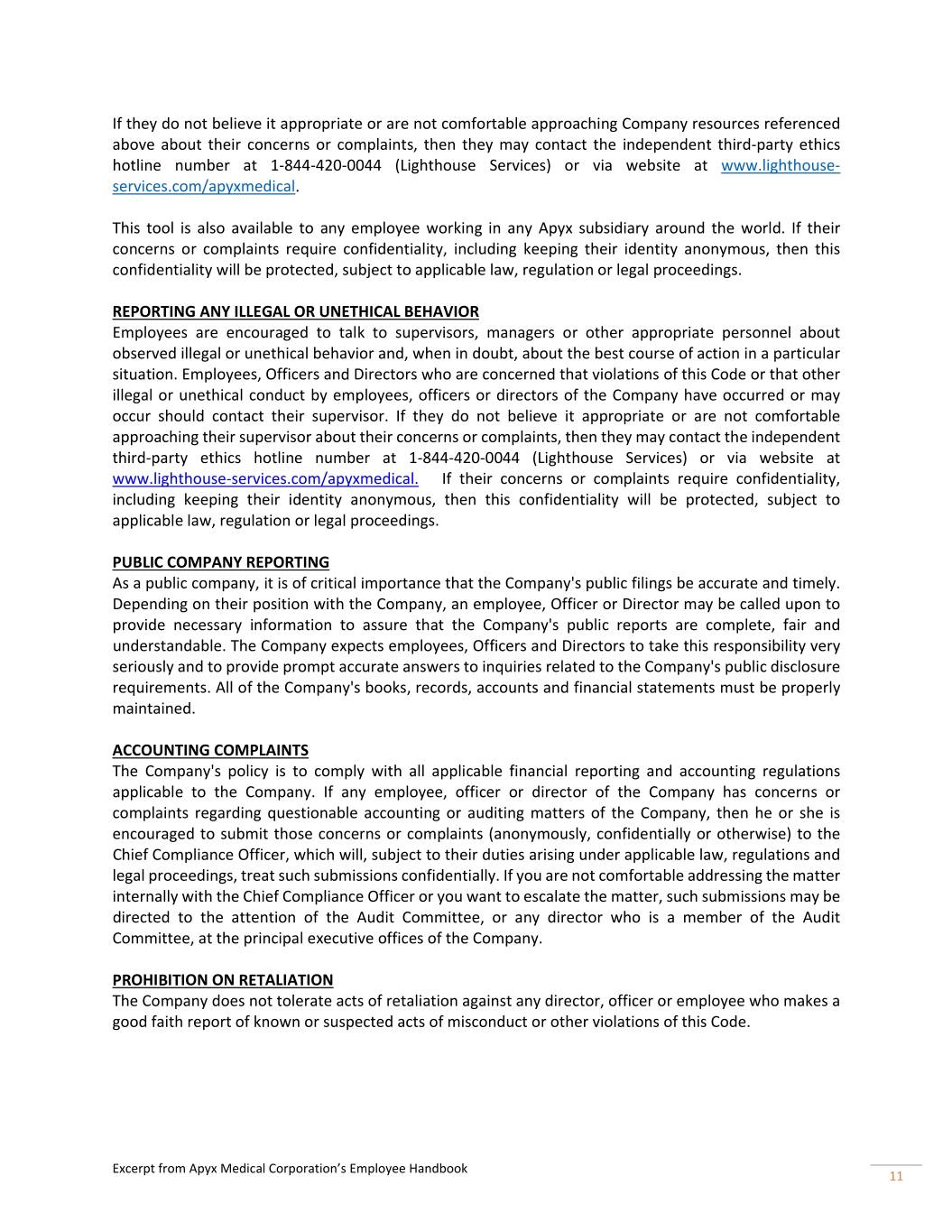
If they do not believe it appropriate or are not comfortable approaching Company resources referenced above about their concerns or complaints, then they may contact the independent third‐party ethics hotline number at 1‐844‐420‐0044 (Lighthouse Services) or via website at www.lighthouse‐ services.com/apyxmedical. This tool is also available to any employee working in any Apyx subsidiary around the world. If their concerns or complaints require confidentiality, including keeping their identity anonymous, then this confidentiality will be protected, subject to applicable law, regulation or legal proceedings. REPORTING ANY ILLEGAL OR UNETHICAL BEHAVIOR Employees are encouraged to talk to supervisors, managers or other appropriate personnel about observed illegal or unethical behavior and, when in doubt, about the best course of action in a particular situation. Employees, Officers and Directors who are concerned that violations of this Code or that other illegal or unethical conduct by employees, officers or directors of the Company have occurred or may occur should contact their supervisor. If they do not believe it appropriate or are not comfortable approaching their supervisor about their concerns or complaints, then they may contact the independent third‐party ethics hotline number at 1‐844‐420‐0044 (Lighthouse Services) or via website at www.lighthouse‐services.com/apyxmedical. If their concerns or complaints require confidentiality, including keeping their identity anonymous, then this confidentiality will be protected, subject to applicable law, regulation or legal proceedings. PUBLIC COMPANY REPORTING As a public company, it is of critical importance that the Company's public filings be accurate and timely. Depending on their position with the Company, an employee, Officer or Director may be called upon to provide necessary information to assure that the Company's public reports are complete, fair and understandable. The Company expects employees, Officers and Directors to take this responsibility very seriously and to provide prompt accurate answers to inquiries related to the Company's public disclosure requirements. All of the Company's books, records, accounts and financial statements must be properly maintained. ACCOUNTING COMPLAINTS The Company's policy is to comply with all applicable financial reporting and accounting regulations applicable to the Company. If any employee, officer or director of the Company has concerns or complaints regarding questionable accounting or auditing matters of the Company, then he or she is encouraged to submit those concerns or complaints (anonymously, confidentially or otherwise) to the Chief Compliance Officer, which will, subject to their duties arising under applicable law, regulations and legal proceedings, treat such submissions confidentially. If you are not comfortable addressing the matter internally with the Chief Compliance Officer or you want to escalate the matter, such submissions may be directed to the attention of the Audit Committee, or any director who is a member of the Audit Committee, at the principal executive offices of the Company. PROHIBITION ON RETALIATION The Company does not tolerate acts of retaliation against any director, officer or employee who makes a good faith report of known or suspected acts of misconduct or other violations of this Code. Excerpt from Apyx Medical Corporation’s Employee Handbook 11
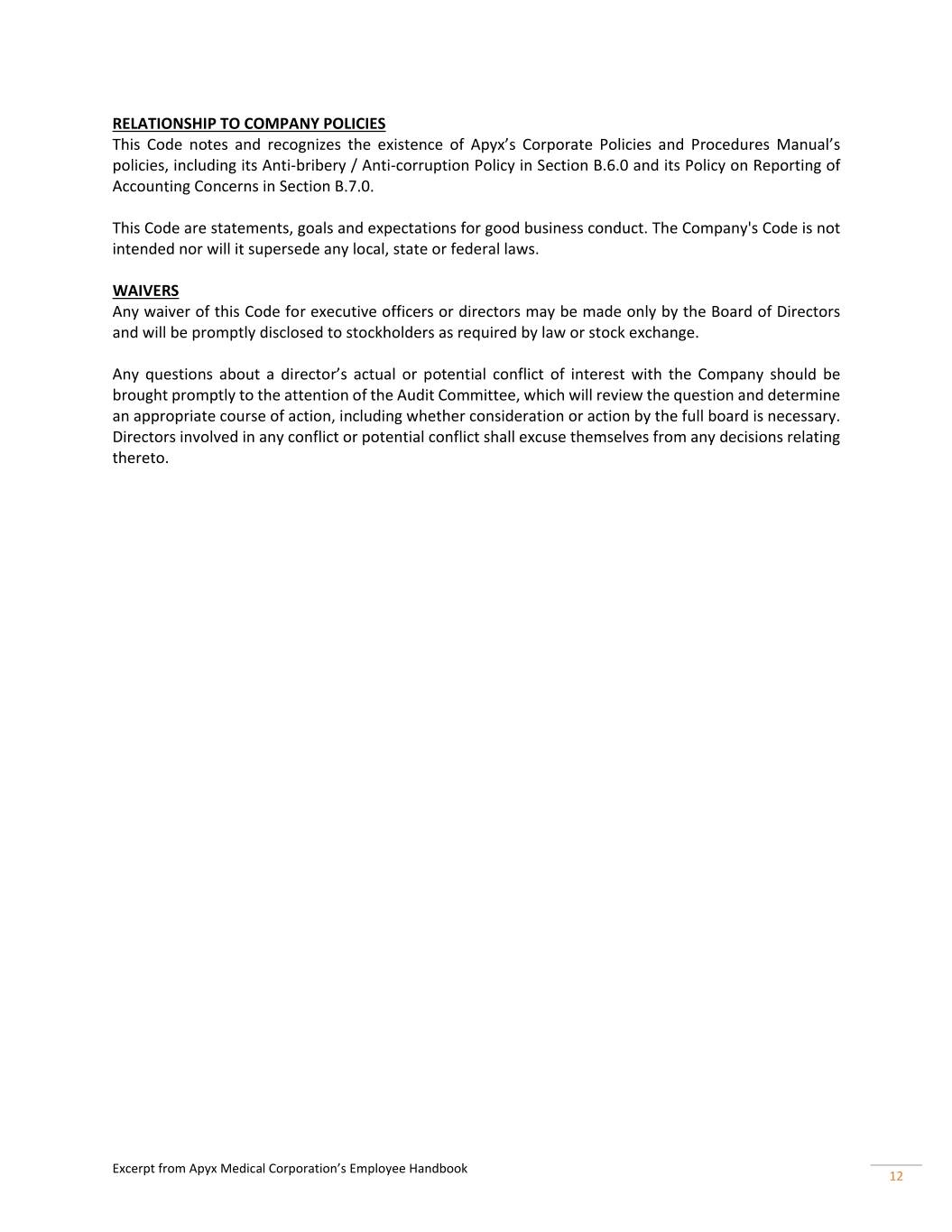
RELATIONSHIP TO COMPANY POLICIES This Code notes and recognizes the existence of Apyx’s Corporate Policies and Procedures Manual’s policies, including its Anti‐bribery / Anti‐corruption Policy in Section B.6.0 and its Policy on Reporting of Accounting Concerns in Section B.7.0. This Code are statements, goals and expectations for good business conduct. The Company's Code is not intended nor will it supersede any local, state or federal laws. WAIVERS Any waiver of this Code for executive officers or directors may be made only by the Board of Directors and will be promptly disclosed to stockholders as required by law or stock exchange. Any questions about a director’s actual or potential conflict of interest with the Company should be brought promptly to the attention of the Audit Committee, which will review the question and determine an appropriate course of action, including whether consideration or action by the full board is necessary. Directors involved in any conflict or potential conflict shall excuse themselves from any decisions relating thereto. Excerpt from Apyx Medical Corporation’s Employee Handbook 12












